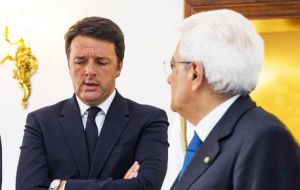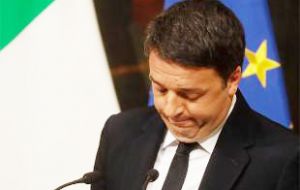MercoPress. South Atlantic News Agency
Renzi told to remain until budget law is passed; calls for quick elections in Italy
 In a decision widely expected, president Sergio Mattarella told Renzi ”to delay his resignation until that task (of the budget law) is completed.”
In a decision widely expected, president Sergio Mattarella told Renzi ”to delay his resignation until that task (of the budget law) is completed.”  Barely an hour after the referendum was resoundingly rejected Sunday by voters, Renzi announced he would keep his promise to quit
Barely an hour after the referendum was resoundingly rejected Sunday by voters, Renzi announced he would keep his promise to quit Calls mounted on Monday from populist and other opposition leaders for quick elections in Italy, seeking to capitalize on Premier Matteo Renzi's humiliating defeat in a referendum on government-championed reforms. But President Sergio Mattarella told Renzi to stay in office a bit longer until a critical budget law is passed. Some officials say Parliament could pass that law as soon as the end of the week.
“With the referendum vote, the Italians have expressed a clear political signal — the desire to go as soon as possible to elections,” wrote Vito Crimi and Danilo Toninelli, two of the top leaders of the populist, anti-euro, 5-Star Movement in a piece accompanying the blog of Movement founder, comic Beppe Grillo.
Barely an hour after the referendum was resoundingly rejected Sunday by voters, Renzi announced he would keep his promise to quit if the measures fail to win popular muster.
With the defeat plunging Europe's fourth-largest economy into political and economic uncertainty, and financial markets seeking reassurances, President Mattarella asked Renzi to hold off on leaving until the budget legislation is passed.
Renzi called on Mattarella at the Quirinal Palace Monday on evening and told the head of state it was not possible to continue in his post, after putting the fate of his nearly three-year-old center-left government on the line in the referendum vote and losing, a palace statement said.
But, in a decision widely expected, Mattarella told Renzi ”to delay his resignation until that task (of the budget law) is completed.“
Mattarella can ask someone else to try to form a government and work with the same Parliament, at least for a few months. Renzi's squabbling Democrats are the biggest party in the legislature, which could lead the president to tap someone from the Democratic Party fold.
But Renzi, as head of the party, could very well decide that early elections are the best course, to avoid the risk of angering the electorate by delaying, ventured Mario Calabresi, editor and commentator at La Republica daily.
Demands mounted from opposition parties, eager to capitalize on Renzi's political misfortunes, for elections to be called far ahead of the spring 2018 due date. Former three-time Premier Silvio Berlusconi, the center-right leader, was among them.
”We are certain that the president of the republic will know how to pinpoint the most correct solution to assure Italians ... the possibility to vote and finally choose, after three non-elected governments,“ Berlusconi said.
Berlusconi himself was forced to resign in 2011 amid growing international concern over Italy's sovereign debt crisis and was replaced by economist Mario Monti, without elections. After Monti's government unraveled, a Democrat, Enrico Letta, was appointed. Renzi, as the Democratic Party leader, used party maneuvering to push Letta out of office and take the premiership for himself in February 2014.
Angling to gain national power for the first time are the 5-Stars, who did well in mayoral races earlier this year, including winning City Hall in Rome, Italy's capital. Grillo himself can't hold office because of a manslaughter conviction arising from an auto accident.
Also energized by Renzi's debacle is the anti-immigrant Northern League, whose leader has allied himself with far-right figures in Europe including France's Marine Le Pen, head of the National Front.
Northern League leader Matteo Salvini called for an immediate election this winter ”because real change happens only through electoral victory.“
While Italy's opposition parties were united in antipathy for Renzi's policies and reform course, they have little else in common and have already begun vying to position themselves for eventual campaigning for Parliament.
Since the Italian president tries to ensure Parliament can carry out its full five-year term, analysts expect that Mattarella will appoint a transition government to draft a new election law that could satisfy parties worried the way the rules now stand, their forces might be at a disadvantage.
Among the names touted to head it are Renzi's finance minister, Pier Carlo Padoan; the president of the Senate, former anti-Mafia prosecutor Pietro Grasso; and Foreign Minister Paolo Gentiloni.
European partners sought to downplay the risk for the common euro currency and European unity.
”This is a crisis of government, not a crisis of state, and it's not the end of the West. But it's certainly not a positive contribution against the backdrop of the crisis in Europe,” German Foreign Minister Frank-Walter Steinmeier said in Athens.
Investors had been anticipating Renzi's defeat for several days, and had sold off Italian stocks and bonds. Monday's sanguine market reaction can also be attributed to the fact that Italy's markets indirectly enjoy a big backstop from the European Central Bank.




Top Comments
Disclaimer & comment rules-

Read all commentsHow long will it be, before the EU just ignores the late test result,
Dec 06th, 2016 - 01:24 pm 0and you can bet they told him to stay,
so they say.
Commenting for this story is now closed.
If you have a Facebook account, become a fan and comment on our Facebook Page!